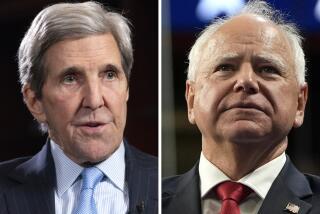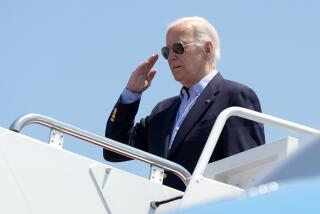Romney, Obama spar on war in Afghanistan
MANCHESTER, N.H. -- When it comes to a host of major domestic issues in the 2012 presidential campaign, a wide chasm separates President Obama from his presumed Republican challenger, Mitt Romney. That’s less true when it comes to foreign policy, especially the war in Afghanistan, where both candidates now favor a drawdown of American troops by the end of 2014.
That doesn’t mean that the two campaigns can’t find grounds for debate. That became apparent again Monday when they traded barbs on an issue that is surely not going to determine the votes of many Americans: how often the president speaks to the American people about progress in the war.
In general, foreign policy is considered one of Obama’s strong suits in the race, and has not been a major focus of the Republican campaign. To the extent that it has, Romney has criticized the president over his policies toward Iran (too friendly) and Israel (not friendly enough).
Answering questions from the crowd at an outdoor appearance at St. Anselm College in Manchester, Romney and his running mate, Rep. Paul Ryan, were asked about Afghanistan -- a topic that has received little attention by either side in the race. The question itself, from a man in a Veterans of Foreign Wars cap, was among the most pointed the two GOP hopefuls faced from the friendly crowd, and underlined the frustration many Americans feel about the 11-year-old war, especially after last week’s shooting of three American soldiers by an Afghan recruit.
Saying his grandson was being deployed to Afghanistan in 45 days, the man said: “I want to know what you guys are going to do about Afghanistan. We’ve got those characters over there shooting our guys, and our guys are coming home in body bags. So when you guys take over in Washington, what are you going to do about this damn mess in Afghanistan?”
Romney went first, repeating charges he has made before that Obama has failed to express a clear mission in Afghanistan and to keep the American people informed. At one time, Romney had been critical of the president for setting a timetable for getting American troops out of Afghanistan, but he now has adopted a similar policy.
“When our men and women are in harm’s way, I expect the president of the United States to address the nation on a regular basis and explain what’s happening, and why they’re there, what the mission is, what its purpose is, how we’ll know when it’s completed,” he said. “Other presidents have done this. We haven’t heard this president do this. This is something he ought to do time and time again.”
Continuing, he said, “I can tell you this: When I become commander in chief, if I’m so lucky, I will address the American people about these issues, and with regards to Afghanistan, I will do everything in my power to transition from our military to their military as soon as possible, bring our men and women home and do so in a way consistent with our mission, which is to keep Afghanistan from being overrun by a new enemy that would allow Afghanistan to be a launching point for terror again like it was on 9/11.”
The remarks were similar to those he made in a recent speech to the VFW in Reno, during which he also said that, as president, his goal would be “to complete a successful transition to Afghan security forces by the end of 2014.”
His remarks on Monday prompted an immediate and somewhat snarky response from the Obama campaign.
“Asked in New Hampshire about his plan to bring our troops home from Afghanistan, Mitt Romney’s response was that he’d address the American public more often if elected,” Obama campaign spokeswoman Lis Smith said in an emailed statement. “That’s simply not enough from someone running to be Commander-in-Chief. The truth is that Romney has refused to put forth a plan for what he would do in Afghanistan. If he does have some secret plan, he owes it to our men and women in uniform to tell them.”
Ryan, following Romney, was somewhat more pointed in his criticism of Obama, suggesting that the president has put politics ahead of national security.
“The point that Mitt was making that I think needs to be punctuated is, the president, in my opinion, has made decisions that are more political in nature than military in nature,” he said. “We want them to fulfill the mission in the safest way possible. and that, to me means, you make decisions based on what’s right for the country, for our national security, and let our men and women serving in the armed forces do their job in the safest possible way -- period, end of story, elections notwithstanding.”
mitchell.landsberg@latimes.com
twitter.com/@latlands
More to Read
Get the L.A. Times Politics newsletter
Deeply reported insights into legislation, politics and policy from Sacramento, Washington and beyond. In your inbox three times per week.
You may occasionally receive promotional content from the Los Angeles Times.










